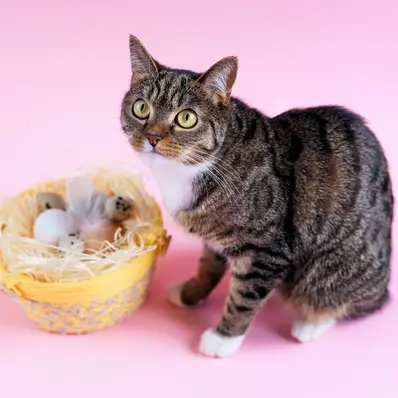Cats Eating Egg Whites?
Cats consuming egg whites can be a nutritious addition to their diet, as egg whites are a rich source of protein. However, it’s important to note that egg whites contain avidin, a protein that can interfere with biotin absorption.
To mitigate this, it’s advisable to offer cooked egg whites in moderation as part of a well-balanced feline diet. Always ensure that the egg whites are free from seasonings or additives, as cats are sensitive to certain flavorings.
Cats Eating Egg Yolks?
Incorporating egg yolks into your cat’s diet can offer a range of beneficial nutrients. Yolks contain essential vitamins like A, D, and B-complex, as well as minerals such as iron and selenium.
While the yolks are nutrient-dense, it’s crucial to feed them in moderation due to their higher fat content. As with any dietary change, start with small amounts and monitor your cat for any adverse reactions.
How to Feed Eggs to Your Cat?
Introducing eggs to your cat’s diet can be a delightful and nutritious experience when done thoughtfully.
Follow these guidelines to ensure a safe and enjoyable egg-feeding routine for your feline companion.
- Cook Thoroughly: Always cook eggs before serving them to your cat to eliminate the risk of salmonella or other bacterial contamination. Scrambled or boiled eggs are popular and well-tolerated options.
- Avoid Seasonings: Keep it simple by preparing eggs without any added salt, pepper, or other seasonings. Cats have sensitive palates, and plain, cooked eggs are usually the best way to offer this treat.
- Start Slowly: If it’s your cat’s first time trying eggs, start with a small amount and observe for any adverse reactions. Some cats may be sensitive or allergic to certain proteins in eggs.
- Incorporate into Meals: Mix small amounts of scrambled eggs into your cat’s regular food to provide added flavor and nutritional benefits. This can be especially helpful for enticing picky eaters.
- Monitor Portion Sizes: While eggs can be a healthy addition, moderation is key. Too much of any treat can lead to an imbalanced diet, so consider eggs as an occasional addition rather than a daily routine.
- Consult Your Vet: If you have concerns about your cat’s diet or specific health conditions, consult with your veterinarian before introducing eggs or any new food into their regimen. They can provide personalized advice based on your cat’s individual needs.
Cautions and Concerns: Risks of Feeding Eggs to Your Cat
Eggs can be a tempting addition to your cat’s diet. They are generally considered safe for feline consumption. However, it’s important to be aware of potential cautions. Always take care when feeding your cat eggs to avoid any health concerns.
- Balancing Obligate Carnivores
Cats are obligate carnivores, and while eggs can be a beneficial addition, it’s crucial to maintain a balanced diet. Ensure that eggs complement, rather than dominate, the protein sources in your cat’s overall nutritional intake.
- Shiny Coat Consideration
While eggs contribute to a shiny coat due to their omega-3 fatty acids, moderation is key. Excessive egg consumption may lead to an imbalanced diet, so carefully monitor portion sizes to avoid nutritional issues.
- Safety in Cooking
Cooked eggs are generally safe for cats to eat, but caution is advised when it comes to raw eggs. Raw eggs pose a risk of salmonella contamination, which can be detrimental to both cats and humans.
- Kittens and Egg Introduction
When considering feeding eggs to kittens, it’s essential to introduce this food item gradually. Their developing immune systems may be more susceptible, and monitoring for any adverse reactions is crucial.
- Dietary Balance
Achieving a balanced diet is key for your cat’s well-being. While eggs are a nutritious addition, they should be part of a broader diet that includes various protein sources to meet your cat’s specific nutritional needs.




